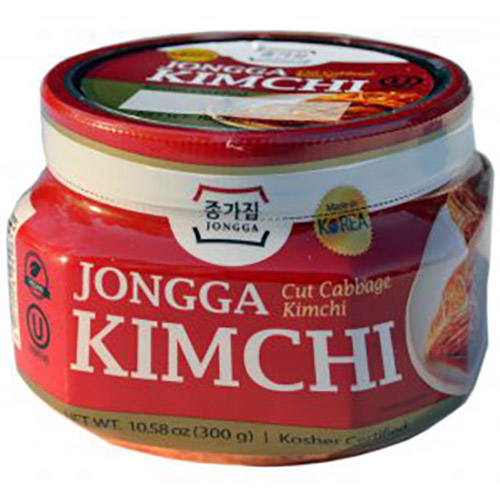




After a COVID-induced hiatus, Kosherfest returned to the New Jersey Meadowlands Conference Center this year with a variety of products, some new and others returning, as vendors sought new buyers. While smaller than previous years, there was an energy and excitement as vendors and buyers were eager to meet each other in person, sample wares and talk food. Since my blog Mipikale focuses on vegan foods, we won’t cover the interesting cheeses and meat products (of which there were several). But here is a review of some of the interesting plant-based products that may find a way to your table, restaurant, or catering hall. A few will get in-depth discussion in future installments.
Kosher Korean
Kosher consumers know Americanized Cantonese and spicier Szechuan Chinese food, going back to the early 20th century when items began appearing on menus in New York and Los Angeles (and of course Bernstein’s on Essex and Moshe Peking). In the 1980s, sushi became ubiquitous at restaurants serving Chinese food and pizza (and just about every big catered event), which must turn heads in Japan. A few kosher Vietnamese restaurants have come and gone in Israel, France and Brooklyn. Some still exist in Israel and there is one in Scottsdale, Arizona (Fresh Mint [http://www.myfreshmint.com/], a vegan restaurant). But there is only one kosher Korean restaurant, Seoul House (https://www.facebook.com/KosherKorean/), and it’s in Jerusalem. If you can’t get there, you can make your own kosher Korean food with the same ingredients they use.
Bongja Ziporah Rothkopf owns Seoul House, and a few years ago she introduced a line of spices and sauces to the U.S. market under her KOKO Kosher Korean brand (http://www.kosherkorean.com). She was at Kosherfest this year and I got to taste her wares. Gochujang is a fermented hot pepper paste, spicy, but not overpowering, with a touch of sweetness. Use it on salads or seitan, and vegetables. Doenjang is a fermented soybean paste used in many Korean soups and bears similarities to the Japanese condiment miso. Ganjang is traditional fermented Korean soy sauce, protein rich and salty. Used in Korean soups, sauces and dressings for vegetables and proteins, it is slow brewed, very concentrated and gluten free (many soy sauces contain wheat and are watered down). Spices include hot and mild versions of gochugaru and meju garu. All are certified by the OK and can be purchased on her website and at local kosher stores.
Also at her booth was Jongga kimchi. From Korea’s largest maker of kimchi, this is a fermented cabbage salad that is pungent and delicious. Certified kosher by the OU, it is available at her website, Amazon and H Mart. Nongshim, an international food company based in South Korea, is also bringing out a Korean BBQ sauce under the OU. Look for it in 2022.
Gluten Free Baking
Arnel McAtee, namesake of Arnel’s Originals GF, Organic Baking Mixes (http://arnelsoriginals.com) was the first person I met at Kosherfest. She is cheery and enthusiastic, and visitors to her booth enjoyed samples of her organic, gluten-free and common-allergen-free baking mixes. She make five mixes: buckwheat (for breads); an all-purpose flour, cookie, and flake pie crust; pancake and waffle (with buckwheat, flax and rice flours); a versatile cake mix (perfect for moist cakes and brownies); and a pizza dough. I sampled lusciously moist, fabulous lemon and spice cakes. Available from her website and certified pareve by Earth Kosher.
Two Great Tastes That Taste Great Together
Like many stuck at home during the pandemic, I baked a lot of bread. I even grew my own sourdough starter, The Queen of Corona, and probably gained about 15 pounds as a result. I experimented with more than a few challah recipes, but one I have not tried is pretzel challah. Maybe I will someday, but it is not necessary since there is Yoni’s Pretzel Challah (http://www.pretzelchallah.com), with the crust of an old-school soft pretzel, with a moist and fluffy inside that we all know and love from challah, even without eggs! That is right, this is a vegan challah, and of course is pareve and free of nuts. Available in traditional, everything, whole wheat, dried fruit and cinnamon, jalapeño, chocolate chip, olive and za’atar. It is also available as mini rolls and half-size challahs. They even make pretzels! It is made under Star-K supervision and available at local kosher markets.
Crispy Fruit
Finally, one of my favorites was Zina’s Fruit Crisps (https://www.zinasfruitcrisps.com). These delicious light, crispy snacks have a very intense fruit flavor. Probably not as nutritious as fresh fruits and vegetables, but certainly less perishable and messy and healthier than potato chips or corn puffs. They are perfect for taking along on a hike, day trip or car ride, and a sweet alternative to salty snacks. Available in three combinations: Pineapple + Apple, Pineapple + Strawberry, and Pineapple + Apple + Beets + Kale. My family and I loved these and, while it is probably not a great idea, would snack on them all day. Available online and hopefully soon in stores. They are certified by the OU.
There was lots more at the show, and I will cover some of the special items in future articles.
Michael Rogovin is an avid home cook and foodie based in Teaneck. He also created the world’s only fully kosher Starbucks café. His blog, Mipikale, focused on the intersection of kosher, vegan and cell-cultivated foods is available at mipikale.com, and on Facebook, Twitter, and Instagram.











